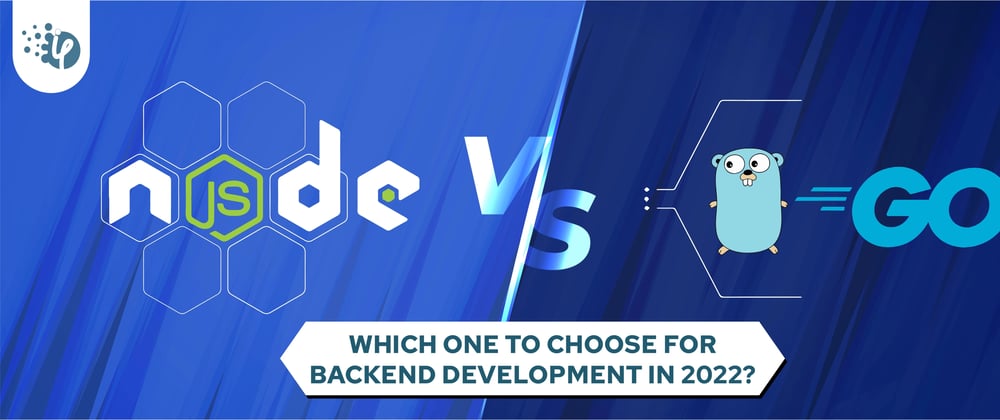What is Node?
Node is an eminent JavaScript runtime environment that is often mistaken for a programming language. Node is used to create background environments for web apps, chat applications, streaming, and more. Well, node might be a popular option in the market these days but there is another option that is getting some hype. i.e., GO language.
What is Go?
Go is a programming language developed by Google experts and is also known as GoLang. It is similar to C as it is a statically typed, open-source, and multi-purpose language. It possesses the speed of Python and the benefits of C. GoLang also comes with memory safety, garbage collection, and communicating sequential processes type concurrency. GoLang has become popular in terms of backend development because of its simplicity and similarity to C and C++. Now, let’s see what each offer in terms of its uses.
Node vs Go: Which one is faster?
Node and its speed
Node is widely known for its speed and efficiency. Its creation was mainly targeted to solve the problem where web applications need concurrency and real-time two-way communication. Node was able to solve this problem and offer it and very good speeds.
GoLang and its speed
Golang is a language that is also known for its speed. It is actually faster than Node in terms of raw performance and speed. With Go, the code is directly compiled into machine language, making it generally faster compared to others as they must be interpreted or have their own virtual environments. In real-time applications, Go outperforms most languages as well.
Read More: Comparative Analysis of Blazor, Angular, React, Vue and Node for Web development
Pros and Cons of Node
Pros of using Node:
Easier to get into:
- Node is easier to get into for beginners as well as experienced JavaScript developers. OOP (Object Oriented Programming) basics and some understanding of how JavaScript works are all you need to dive into Node.
Simplicity:
- Node keeps it simple as developers can use the same language on both the front-end and back-end side. It helps in reducing file sizes and provides a cleaner structure. It will also allow for code reusability, making the development process easier.
Easier to market:
- Applications built using Node are very quick to build and scale. This allows startups to quickly build and deploy Node applications.
High performance:
- Node provides high performance as it is interpreted on the Chrome V8 engine. The Chrome V8 engine compiles the JS code directly into machine code.
Community:
- Node has a large and very active community. This is helpful for beginners and experienced developers as well. An active community helps in enhancing the already efficient environment. It is believed that an active community will allow for more new developers in Node.
Extensible:
- Node can be highly extensible. We can customize and enhance node as per our needs.
Cons of using Node:
Unstable API:
- One of the recurring complaints of node is that the API keeps on changing. This causes developers to keep on changing code.
Lack of robustness:
- Node might have lots of libraries, but it lacks robustness. Strong library support is lacking in JavaScript and so this can be a con of using node.
Asynchronous model:
- The asynchronous behavior of Node can be extremely useful. Yet some developers do not like its nature and prefer the older I/O blocking method.
Looking to hire Node.js developers? Your search ends here.
Pros and Cons of GO
Pros of using Go:
Learning curve:
- Go has a small to medium learning curve. It is usually easy to learn if you are aware of the basics of computer programming and OOP (Object Oriented Programming). A beginner can easily understand Go and get used to it within a couple of months.
Speed:
- GO is one of the fastest-performing languages out there. It provides great execution speed and is faster than Node. Its compilation is beyond most languages' speed.
Optimal performance:
- As the code will be statically typed it will ensure higher speeds compared to other interpreted languages.
Documentation
- Go documentation is genuinely great. It is very helpful for beginners and allows for an easier debugging process. You can find the documentation for Go here.
-
The documentation also guides you through a step-by-step process of creating basic tasks like modules and so on.
Excellent concurrency:
Go is usually known for its concurrency in the community. It is one of its strong points. Go has a different approach when it comes to bringing concurrency to the table. Go has Goroutines which are used to make concurrency possible.
Growth:
- Go is already one of the most in-demand languages in the market as of now. Go will continue to grow in demand in the future too as other companies recognize the importance and benefits of using Go as well.
Cons of using GO:
- Go is a fantastic language, but it still has a few flaws that developers dislike. Here are the cons of using Go:
Time:
- Go takes a lot of time compared to other languages, as it is a statically typed language. We will have to write more lines of code in Go compared to a language like Python that is not that descriptive. This is something that normally turns developers off since spending more time writing is not desirable when other languages may deliver faster outcomes.
New language:
- It is a newer language in terms of demand and hype. The language was actually found in 2009. With the language being new, developers can often face issues with existing libraries. The lack of SDKs also causes developers to write extra code.
Niche:
- When we talk about languages and frameworks they often are related to their niches. Go is an exception. It hasn’t found a proper niche for itself yet in the market. It is used in web development, AI and ML projects, and many more areas.
GUI library:
- Go has no GUI library so using it can be tricky as mostly we have to find third-party solutions for it instead of using native solutions in our project.
Conclusion
In this blog, we learned about the strengths and weaknesses of using both Node and Go. These languages, being great in their strengths, also have some weaknesses. In the end, it will always come down to the demand of the project and what is best for it. Developers usually opt for an easier-to-code approach but sometimes time and efficiency are also important. At the end, these languages are definitely worth investing your time.







Top comments (16)
In my opinion, Node + TypeScript is so much mental baggage that you're better off using Go. HOWEVER, one shouldn't be blind to market realities. As such, we can "prefer" a technology stack, but we certainly don't get to "choose" one.
"It possesses the speed of Python and the benefits of C."
lol
Yeah that should be kinda the other way around, lol ;)
Reminds me of a quip I thought was funny...
(Note: I like Java. I like Python. I have a love-hate relationship with C++. For those who are Java fans, substitute C# for Java.)
I vaguely remember having heard that one before as well haha :)
I appreciate everyone's thoughts and opinions on the matter. However, as discussed above every language being great in their strengths, also have some weaknesses. This blog just provided a high-level overview of Node vs. GO. Finally, everyone has to choose the finest language that meets their company needs and offers value to their time investment.
Thank you for taking time to read our blog.
This article kinda obscures the fact that Go really runs rings around Node when it comes to performance (talking about highly scalable network apps) ...
Node is not high performance. It's pretty slow compared to other solutions.
Haven't tried python though....
Read stories about companies running high scalability networking apps (think REST APIs and sockets and all that), and after converting their codebase from Node to Go they ended up needing one fifth or one tenth of the hardware to run it ...
Now faster with uWebSockets.js.
web-frameworks-benchmark.netlify.a...
Me who is studying java (Done with basics and advanced topics) to learn backend development with spring and spring boot
There is Rust also, way faster than both of node and go all together. Deno, for instance, developed using Rust..
🤦🏻♂️🤦🏻♂️🤦🏻♂️
Yes, It's really tough compared to node and go.
One day I want to give Go a try.
Elixir + test suite